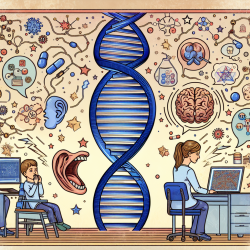Introduction
In the ever-evolving field of pediatric therapy, ensuring the safety and efficacy of treatments is paramount. The research article "ODAE: Ontology-based systematic representation and analysis of drug adverse events and its usage in study of adverse events given different patient age and disease conditions" provides a data-driven approach to understanding adverse drug events (ADEs) through the Ontology of Drug Adverse Events (ODAE). This ontology-based framework offers a comprehensive method for analyzing ADEs, considering factors such as patient age and disease conditions. This blog explores how practitioners can leverage these insights to enhance therapeutic outcomes for children.
Understanding ODAE
The Ontology of Drug Adverse Events (ODAE) is a robust knowledge base that systematically represents ADEs across various drugs, ages, and disease conditions. By utilizing a generalizable design pattern, ODAE enables practitioners to explore the complex relationships between drugs, adverse events, and patient demographics. This approach facilitates a deeper understanding of how different factors influence the occurrence and severity of ADEs.
Application in Pediatric Therapy
For practitioners in pediatric therapy, the insights from ODAE can be instrumental in tailoring interventions to individual needs. Here are some practical applications:
- Personalized Treatment Plans: By understanding the specific ADEs associated with drugs used in pediatric populations, therapists can develop personalized treatment plans that minimize risks and maximize therapeutic benefits.
- Informed Decision-Making: ODAE provides a data-driven foundation for making informed decisions about drug selection and dosage, taking into account the unique physiological and developmental characteristics of children.
- Enhanced Monitoring: With knowledge of potential ADEs, practitioners can implement enhanced monitoring protocols to detect and address adverse reactions promptly, ensuring the safety of young patients.
Encouraging Further Research
While ODAE offers a comprehensive framework for understanding ADEs, it also highlights the need for ongoing research. Practitioners are encouraged to engage in further studies to explore the nuances of drug interactions and their impact on pediatric populations. Collaborative efforts can lead to the development of more refined ontologies and improved therapeutic strategies.
Conclusion
The integration of ontology-based analysis into pediatric therapy represents a significant advancement in ensuring safe and effective treatment outcomes. By leveraging the insights from ODAE, practitioners can enhance their skills, make data-driven decisions, and ultimately improve the lives of children in their care.
To read the original research paper, please follow this link: ODAE: Ontology-based systematic representation and analysis of drug adverse events and its usage in study of adverse events given different patient age and disease conditions.










